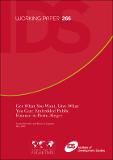Get what you want, give what you can : embedded public finance in Porto Alegre
Abstract
The problem of public finance in Latin America is a structural contradiction. The historical
pattern of insertion in the international economy creates a large number of poor who have
very real material needs for public services, but they cannot individually or collectively
contribute the funds to pay for them. Rich people hold wealth, but they are unwilling to
contribute to public services that go to other groups while they turn to private schools,
education and transportation. They are especially unwilling to hand over their wealth to
governments perceived as corrupt, inefficient, and illegitimate. This raises a basic puzzle:
how do governments provide for those in need while securing the compliance of those
with wealth?
In this context, the innovation of participatory budgeting is a striking example of embedded
public finance in which taxes and expenditures are rooted in government legitimacy. Three
elements comprise embedded public finance:
l Democratic participation in which an increasing number of citizens participate in public
decisions, and different groups, especially the poor, have been incorporated;
l Progressive public spending in which investment in poor neighbourhoods has increased
both in absolute terms and in relation to rich neighbourhoods;
l Competent governance in which perceptions of corruption have decreased, and
administrative structures riddled with clientelism and patronage have been reformed.
These three elements rest atop a political coalition that joins middle sector and poor voters.
Because these citizen groups have different needs, the state had to tailor the benefits it
extended to the demands of each group. This strategy allowed the state to mobilise distinct
contributions from each group, votes from the poor and tax compliance from those with
wealth.
Keywords: public finance, participatory budgeting, tax, Port Alegre, investment, public
expenditure.
Citation
Schneider, A. & M. Baquero (2006) Get what you want, give what you can : embedded public finance in Porto Alegre. Working paper series, 266. Brighton: IDS.Is part of series
IDS working papers;266Library catalogue entry
http://bldscat.ids.ac.uk/cgi-bin/koha/opac-detail.pl?biblionumber=157091Rights holder
Institute of Development StudiesCollections
- IDS Research [1671]

